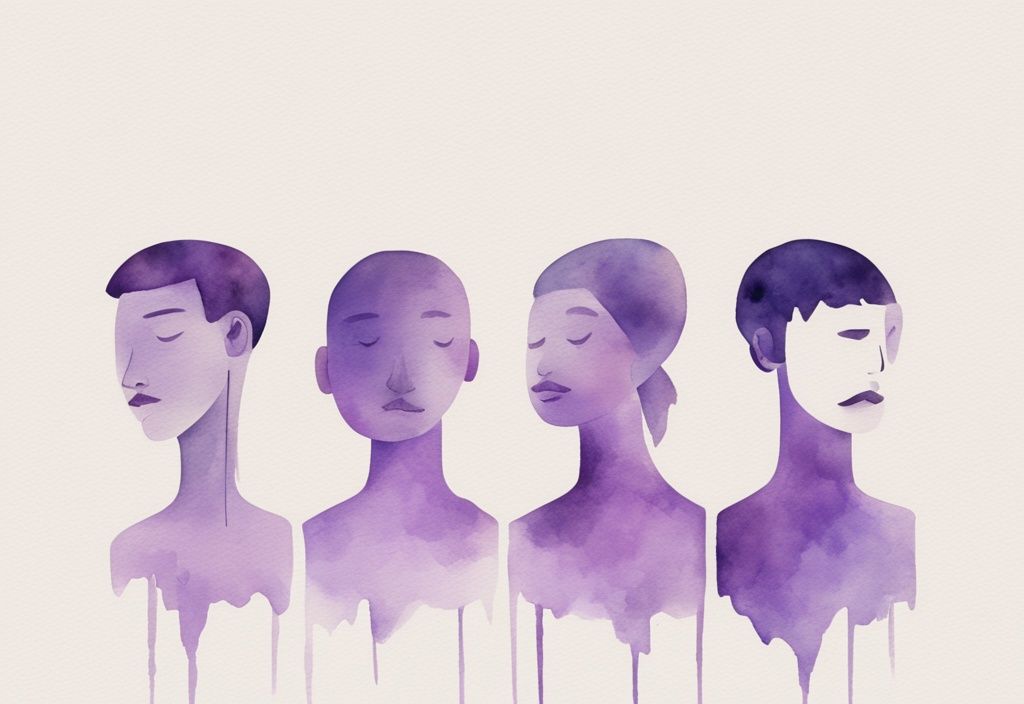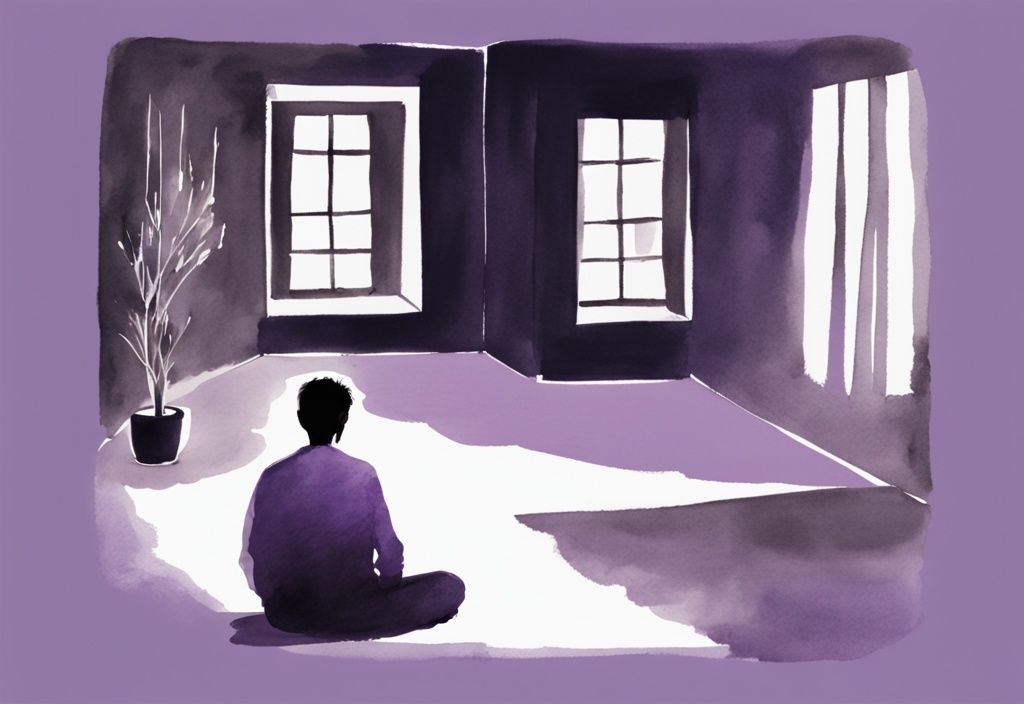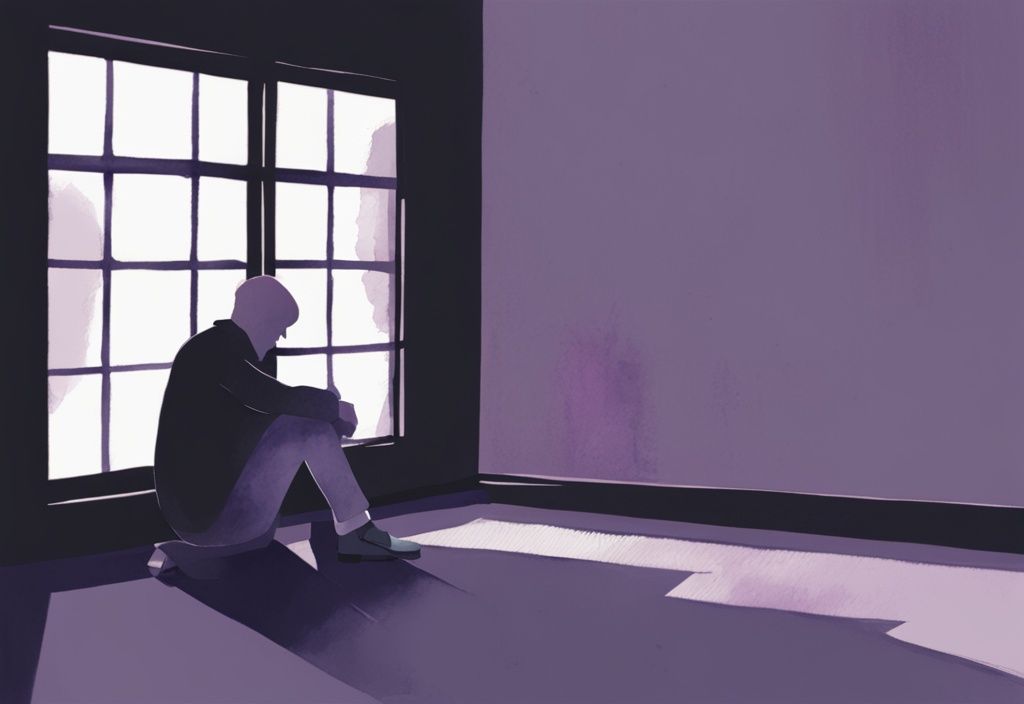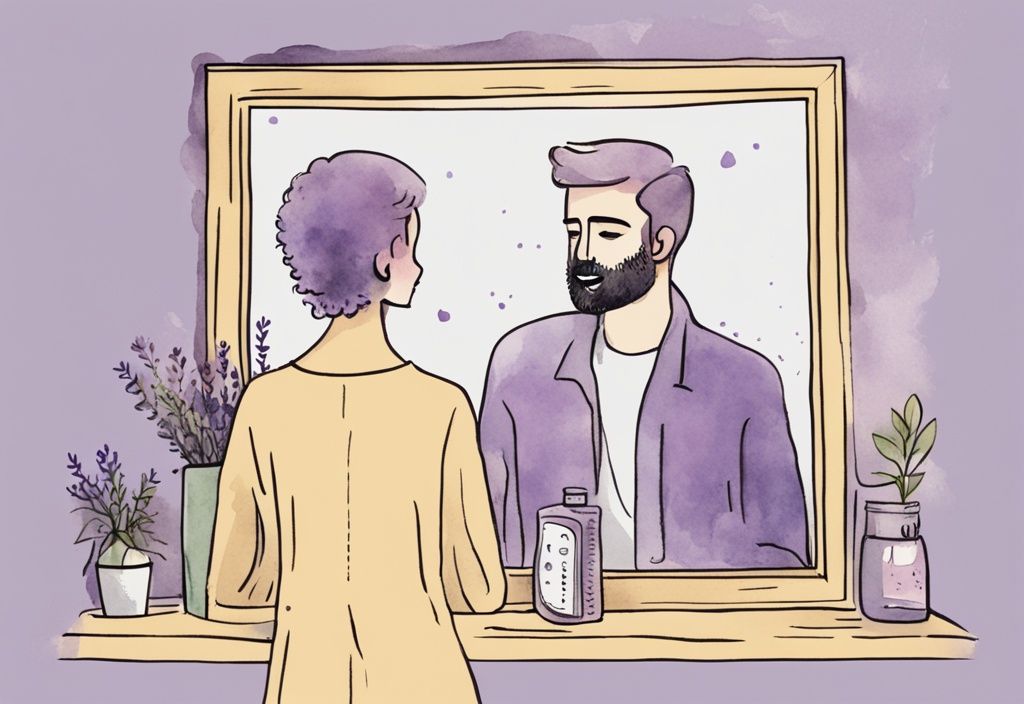Understanding the Stages of Guilt After Cheating – A Guide
Is the hurricane of guilt after cheating making your heart bleed raw? You’re not alone. In fact, it’s a clandestine journey most are forced to navigate in private, often stuck in the maze of guilt and remorse.
This article candidly explores the stages of guilt following infidelity. It’s a road map for both the transgressors and the betrayed, delicately untangling the emotional web of denial, anger, bargaining, depression, and acceptance.
Together, we’ll dab at your wounds offering meaningful insights and practical strategies to help you clasp the reins of your emotions and take steady steps towards healing. Because acknowledging the guilt is only the first part of recovery, the true battle begins after.
Understanding the Emotional Journey Post-Cheating
- Understanding the stages of guilt after cheating helps both partners comprehend and manage the healing process. This layered emotional journey allows partners to navigate through complex feelings and initiate effective healing.
- Guilt is a common emotional response following cheating, often accompanied by feelings of regret, remorse, and shame. These feelings may serve as both barriers and catalysts to the relationship’s recovery process.
- The stages of guilt after cheating are similar to the Kübler-Ross 5 stages of grief: denial, anger, bargaining, depression, and acceptance. This similarity highlights the depth of emotional turmoil and the structured pathway toward healing.
The Denial Stage
Behaviors of the Cheating Partner
- The cheating partner may try to cover up the truth, masking their actions with lies or omissions.
- Denial of infidelity or justification of their actions is common, often leading to premature optimism and making excuses.
Reactions from the Betrayed Partner
- The betrayed partner might struggle to believe the cheating occurred, creating initial cognitive dissonance.
- They may ask questions to understand the situation, attempting to gather facts amidst their shock.
The Anger Stage
Internal Conflict for the Cheating Partner
- Feelings of anxiety and guilt are common, leading to self-blame and resentment toward their partner.
- The cheating partner might feel cornered, grappling with an internal struggle between their actions and their ethical compass.
Emotional Turmoil for the Betrayed Partner
- The betrayed partner feels anger or frustration at themselves or their partner, sometimes directing anger towards the third party.
- Self-directed anger may stem from feelings of powerlessness or foolishness, intensifying their emotional strife.
The Bargaining Stage
Regret and Self-Blame of the Cheater
- Involves hindsight and self-blame, with the cheater often asking to resume the relationship or acting more affectionate.
- Attempting to imagine different outcomes and wishing for a reversal of their actions is common.
Negotiating Trust and Terms
- The cheater may try to negotiate terms to regain trust, promising changes in behavior or greater transparency.
- This stage involves seeking forgiveness and making concessions to repair the relationship.
The Depression Stage
Deep Regret and Self-Loathing in Cheaters
- The cheating partner experiences deep regret and sadness, with self-loathing and full confrontation of their guilt.
- Emotional exhaustion and apathy are quite common, leaving the cheater feeling drained and remorseful.
Hopelessness and Emotional Pain in Betrayed Partners
- The betrayed partner comes to terms with the full impact of the affair, facing hopelessness about future trust and the relationship’s future.
- They may experience deep emotional pain and a sense of loss, struggling to envision a path forward.
The Acceptance Stage
Full Responsibility and Realization by the Cheater
- The cheating partner acknowledges their mistake and takes full responsibility, realizing they can’t control the consequences.
- Acceptance of their actions and the reality of their betrayal marks a significant step towards healing.
Healing and Forward Thinking for the Betrayed Partner
- The betrayed partner comes to terms with what happened, focusing on the future and beginning the healing process.
- Incorporating the reality of betrayal into one’s life and planning steps forward becomes a focal point.
The Non-Linear Progression Through Stages
- The progression through these stages is not always linear, as individuals may revisit certain stages multiple times.
- Emotional fluctuations are normal and part of the healing process, requiring patience and understanding from both partners.
The Role of Professional Therapy in Healing
- Working through these stages with a professional therapist is crucial for productive healing, providing a structured environment for addressing difficult emotions.
- Both individuals may benefit from individual and couples therapy sessions, facilitating comprehensive emotional recovery.
Differentiating Guilt from Remorse
Understanding Guilt and Its Impacts
- Guilt focuses on the person feeling the emotion, producing anxiety, restlessness, and possibly defensive behavior.
- This self-focused emotion can hinder true reconciliation if not addressed appropriately.
Recognizing Signs of Remorse
- Remorse involves empathy for the pain caused to the partner, taking actionable steps to show regret.
- A deeper understanding and concern for their partner’s pain marks true contrition and a willingness to mend the relationship.
Symptoms of the Cheater’s Guilt
Overcompensation and Emotional Distancing
- Cheaters may overcompensate by showering affection or gifts, trying too hard to make amends.
- Emotional distancing as a self-defense mechanism is also common, protecting themselves from the shame and guilt experienced.
Anxiety, Restlessness, and Increased Aggression
- Signs include anxiety and restlessness, with increased aggression as a symptom of underlying guilt.
- These emotional reactions can complicate the path to reconciliation and healing.

Steps Toward Forgiveness and Rebuilding Trust
Transparency and Communication
- Being transparent about whereabouts and actions is essential, establishing a foundation for rebuilding trust.
- Open and honest communication is vital for rebuilding trust, addressing any lingering doubts or fears.
Support Systems for Recovery
- Support from friends, family, and therapists plays a critical role in recovery, providing external perspectives and emotional support.
- Self-compassion and self-care are critical for dealing with guilt, fostering a healthier emotional environment.
Managing Post-Traumatic Stress from Cheating
Recognizing PTSD Symptoms
- Symptoms include intrusive thoughts, emotional instability, out-of-body experiences, alternating emotions, and feelings of powerlessness.
- Recognizing these signs early helps in seeking appropriate interventions and support.
Recovery Strategies and Professional Help
- Professional therapy and counseling provide tailored strategies for managing and overcoming PTSD.
- Maintaining a healthy lifestyle, including diet, exercise, sufficient sleep, and relaxation methods, contributes to overall well-being and recovery.
Addressing the Root Causes of the Affair
- Identifying and addressing the root causes of the affair are critical for comprehensive healing and prevention.
- Understanding patterns and behaviors that led to the infidelity helps in instituting long-lasting changes within the relationship.
Conclusion
- Navigating through the stages of guilt after cheating is complex and non-linear, demanding both partners engage in open communication and seek professional help.
- Acceptance and healing are possible with time, effort, and appropriate support, marking the beginning of a stronger, more resilient relationship.
The Denial Stage
In the stages of guilt after cheating, the denial stage is often the most tumultuous. This phase involves a complex interplay of behaviors and emotions from both the cheating and betrayed partners. Understanding these dynamics can help navigate this painful period.
Behaviors of the Cheating Partner
- Covering Up the Truth: In the initial phase of the stages of guilt after cheating, the cheating partner often resorts to concealing their actions. This can involve lying about details or completely denying any infidelity occurred.
- Denial and Justification: Many cheaters find it easier to deny the infidelity or to rationalize it by placing blame elsewhere. Justification might include claims of unmet needs or other pressures that led to their actions.
- Premature Optimism and Excuses: The cheating partner may also exhibit an unrealistic sense of optimism, assuming the situation will resolve without significant repercussions. They might make excuses, minimizing the affair’s impact and brushing off concerns.
Reactions from the Betrayed Partner
- Struggling to Believe: For the betrayed partner, absorbing the reality of cheating can be deeply challenging. Initially, they may be unable to accept that infidelity has occurred, leading to confusion and disbelief.
- Seeking Understanding: In an attempt to make sense of the situation, the betrayed partner often asks numerous questions. This need for clarity is part of their effort to understand the details and context of the betrayal, despite its painful nature.
- Cognitive Dissonance and Shock: Experiencing cognitive dissonance is common as the betrayed partner’s mind tries to reconcile their previous perceptions of the relationship with the new, hurtful reality. This stage is often marked by emotional shock and unrest.
The Anger Stage
The anger stage is a pivotal part of the stages of guilt after cheating. It’s marked by intense emotions and internal struggles for both the cheating partner and the betrayed partner. During this stage, conflicting feelings and defensive mechanisms come to the forefront, setting the stage for deeper emotional processing and healing.
Internal Conflict for the Cheating Partner
- The cheating partner experiences overwhelming anxiety and guilt, creating a storm of internal chaos. These feelings hit like crashing waves, leaving them in significant distress.
- Blame-shifting often becomes a defensive strategy. In an attempt to deflect personal guilt, the cheating partner might find themselves unjustly blaming their partner.
- This stage is fraught with a profound moral struggle. The cheater is deeply conflicted, wrestling with their actions and ethical values, which leads to a harrowing inner turmoil.
Emotional Turmoil for the Betrayed Partner
- The emotional journey for the betrayed partner during the anger stage is vast and varied. Dominant feelings include intense anger and frustration, often directed inward, questioning why they missed the signs.
- The third party in the affair also becomes a focal point for the betrayed partner’s anger. There’s a compelling need to hold someone accountable for their pain.
- Feelings of powerlessness and a sense of being foolish can exacerbate self-directed anger. This leads to questioning one’s own self-worth and judgment, spiraling into a mix of negative emotions.
The Bargaining Stage
The bargaining stage is a critical phase in coping with guilt after cheating. It encapsulates the emotional turmoil and efforts to rectify the transgression, paving the way for potential reconciliation.
Regret and Self-Blame of the Cheater
During the bargaining stage, the cheating partner is often engulfed by a whirlwind of regret and self-blame. This stage is marked by relentless self-reflection and second-guessing, with the cheater repeatedly asking themselves, “What if I had acted differently?” The hindsight can be both a blessing and a curse, serving as a reminder of what went wrong and what could have been done to prevent the heartbreak.
In an attempt to cope with the overwhelming guilt, the cheater might express a strong desire to mend the broken relationship. This often manifests through increased affection, as they try to prove their renewed commitment to their partner. You may see them performing acts of kindness or showing more attentiveness in an effort to showcase their love and dedication. These actions stem from a deep-rooted need to undo the past, even if it’s just in their mind, by imagining countless ‘what if’ scenarios—each one a desperate attempt to rewrite their history.
Negotiating Trust and Terms
As part of the reconciliation process, the cheating partner actively seeks to rebuild the shattered trust. This stage involves negotiating new terms and conditions in the relationship to ensure transparency and accountability. They might promise more openness about their whereabouts, share passwords, or set stronger boundaries with others.
Forgiveness becomes the cornerstone of this stage. The cheater is often ready to make significant concessions and accept new constraints set by their partner. These efforts can include agreeing to increased accountability, participating in joint activities to rebuild trust, or even attending therapy sessions to address the root causes of their behavior.
This stage is laden with emotional negotiations and is a testament to the dedication of both partners to heal and restore their relationship. The cheater’s willingness to change and the betrayed partner’s openness to forgiveness signify a potential path to reconciliation. It represents a pivotal moment where both parties invest in creating a stronger, more transparent relationship moving forward.
The Depression Stage
The depression stage in the process of dealing with infidelity is a profound and complex emotional journey for both the cheating partner and the betrayed person. This stage of guilt after cheating is often characterized by intense feelings of regret, self-loathing, hopelessness, and emotional pain. It dives deep into the human psyche, unraveling layers of sorrow and anguish. Here, we explore these facets in greater detail to provide a comprehensive understanding of this crucial stage.
Deep Regret and Self-Loathing in Cheaters
- In the wake of cheating, the unfaithful partner plunges into a profound sorrow, overwhelmed by the enormity of their actions. This stage is marked by a reflective and intense acknowledgment of their transgressions.
- As the full weight of their decisions settles in, self-loathing takes hold. The cheater grapples with the reality of their choices, deeply regretting the pain they have caused. This intense self-reproach can be utterly debilitating.
- Emotional exhaustion becomes a constant companion during this phase. The cheater feels drained from the relentless confrontation with their guilt. Apathy often overshadows their ability to engage fully in daily life, creating a seemingly endless cycle of sorrow and regret.
Hopelessness and Emotional Pain in Betrayed Partners
- For the betrayed partner, this stage forces them to confront the shattering realization of the affair’s full impact. This is an essential component in the stages of guilt after cheating. The painful truths about their relationship come to the forefront.
- Hope begins to diminish as they struggle to envision a future where trust can be rebuilt. The task of mending what has been broken feels daunting and almost insurmountable, casting a shadow over their perception of the future.
- Deep emotional pain sets in, coupled with a profound sense of loss. This anguish is not solely about the betrayal itself but also about the investment and dreams shared within the relationship. The sense of loss is all-encompassing, touching every aspect of their shared history.
The Acceptance Stage
The Acceptance Stage is a pivotal turning point in the complex journey of navigating the stages of guilt after cheating. This phase brings both the cheater and the betrayed partner to a profound realization, encouraging genuine reflection and the potential for meaningful growth.
Full Responsibility and Realization by the Cheater
- Acknowledgement of Mistake: At this juncture, the cheating partner fully recognizes their wrongdoing and understands the gravity of their actions. This awareness marks a crucial step in the stages of guilt after cheating, where denial melts away and raw truth takes its place.
- Acceptance of Consequences: They come to terms with the reality that the aftermath and consequences of their actions are beyond their control. This acceptance is transformative; it helps them stop trying to manipulate outcomes or deflect blame, fostering a more authentic engagement with the situation.
- Reality of Betrayal: The cheater confronts the harrowing reality that they have deeply wounded their partner. This acceptance is introspective, involving a profound understanding of the pain caused, and is essential in moving forward in the stages of guilt after cheating.

Healing and Forward Thinking for the Betrayed Partner
- Coming to Terms: The betrayed partner starts to fully accept the stark reality of the situation. This stage allows them to process their tumultuous emotions and begin moving past the denial and anger that dominate earlier stages of guilt after cheating.
- Future Focus: By shifting their attention away from past hurts, they start to concentrate on personal growth and future well-being. This can involve setting new, empowering goals and reflecting on what they need for their own happiness and healing.
- Planning Steps Forward: As they incorporate the event of betrayal into their life narrative, they use it as a stepping stone for future decisions. Whether they choose to rebuild the current relationship or move forward on their own, the focus is on positive action and ongoing healing.
The Non-Linear Progression Through Stages
The journey through the stages of guilt after cheating can often feel like an emotional rollercoaster. Healing isn’t a straightforward path; it’s a complex process where one might revisit certain stages more than once. These fluctuating emotions are natural and should be anticipated, not feared.
Revisiting Stages Multiple Times
It’s common for both the cheating partner and the betrayed partner to experience emotions in an unpredictable manner. For example, you might think you’ve reached the acceptance stage, only to find yourself suddenly overwhelmed by anger or depression again. Understanding that this back-and-forth is a standard part of the recovery process can help manage expectations and keep both partners committed to healing.
Emotional Fluctuations
Every individual’s journey through the stages of guilt after cheating is unique. Personal resilience, the nature of the relationship, and available support systems heavily influence it. Emotional fluctuations—such as sudden bouts of sadness or anger—are integral to the healing process. These variations should be seen as opportunities to tackle unresolved feelings and continue the journey toward healing.
Normalizing the Non-Linear Process
Recognizing that progress may not be smooth is essential for both partners. Accepting this non-linear progression promotes greater patience and empathy within the relationship. It underscores the importance of continuous communication, self-care, and possibly the guidance of a professional therapist. By acknowledging this uneven progression, partners can build a more robust foundation for trust and recovery.
The Role of Patience and Support
Patience and support are vital in navigating this non-linear journey. Each partner may be at different stages at different times, and understanding this can prevent additional conflicts. By fostering an environment of support and patience, both the cheating and betrayed partners can work through the emotional turmoil toward eventual acceptance and healing.
In conclusion, the stages of guilt after cheating are inherently non-linear, with possible returns to previous stages and fluctuating emotions. Recognizing and normalizing this pattern is crucial for managing expectations, maintaining patience, and supporting each other’s emotional well-being.
The Role of Professional Therapy in Healing
Exploring the stages of guilt after cheating with a professional therapist is paramount for constructive healing. This therapeutic journey allows both partners to process emotions within a structured, supportive environment.
Structured Environment for Emotional Exploration
A therapist offers a safe haven where both the cheater and the betrayed partner can candidly delve into their feelings without fear of judgment. This controlled setting helps bring to light difficult emotions such as guilt, shame, and heartbreak that might otherwise stay hidden.
Addressing Difficult Emotions
Therapy touches on the intricate emotions accompanying the stages of guilt after cheating. By working both individually and as a couple, participants can gain a deeper understanding of their own and each other’s emotional reactions. This comprehension is vital for navigating stages like denial, anger, bargaining, depression, and acceptance.
Individual and Couples Therapy Sessions
Both individual and couples therapy are essential. During individual sessions, each person can tackle their personal feelings and traumas. Contrastingly, couples therapy concentrates on rebuilding trust, enhancing communication, and nurturing intimacy. This dual approach ensures that both partners are healing individually and together, thereby reinforcing the overall recovery process.
Guidance Through Non-Linear Progression
The journey through the stages of guilt after cheating is rarely straightforward. Therapists offer guidance through these fluctuations, providing support when either or both partners revisit earlier stages. This professional insight helps maintain progress and avert emotional setbacks.
Practical Strategies for Recovery
Therapists equip couples with practical strategies to manage the aftermath of infidelity. These might include exercises to improve communication, trust-building activities, and tools for handling stress and emotional pain. By applying these techniques, partners can work towards a healthier, more stable relationship.
- Structured emotional exploration – Therapy provides a safe space to uncover and discuss buried emotions.
- Guided navigation – Therapists help address complex emotions, aiding in the passage through the stages of guilt.
- Dual approach – Both individual and couples therapy enhance personal and relational healing.
- Practical tools – Therapists equip couples with strategies to rebuild trust and improve communication.
Professional therapy not only aids in navigating the complex stages of guilt after cheating but also serves as a cornerstone for long-term emotional health and relational stability, as highlighted in resources such as this continuing education activity. Its structured method ensures that both partners can heal and move forward constructively.
Differentiating Guilt from Remorse
Understanding the emotional landscape that follows cheating can be complex, especially when it comes to guilt and remorse. This section unpacks these nuanced feelings and their distinct impacts on both the individual and their partner.
Understanding Guilt and Its Impacts
Guilt is an emotion that primarily turns inward. It compels you to reflect on your actions and their consequences, often creating a spiral of anxiety and restlessness.
- The weight of guilt can manifest in countless ways, from sleepless nights to a constant state of worry.
- It’s not uncommon to see defensive behaviors emerge as guilt-ridden individuals attempt to justify or even deny their actions, all in a bid to protect their self-image.
This internal turmoil does little to address the hurt caused to your partner. Instead, it becomes an all-consuming personal battle.
Recognizing Signs of Remorse
Remorse, however, shifts the focus outward. It’s where genuine empathy enters the picture, driving a profound concern for your partner’s pain and emotional well-being.
- Unlike guilt, remorse isn’t about self-preservation. It’s about truly understanding the impact of your actions and feeling genuine sorrow for the hurt inflicted.
- Those experiencing remorse are often moved to take concrete steps to make amends, whether it’s through heartfelt apologies or changes in behavior that demonstrate their regret.
- This deep emotional response involves an earnest effort to help their partner heal, reflecting a greater awareness and care for the relationship’s recovery.
Navigating the stages of guilt after cheating, it’s crucial to distinguish between these two emotions. Understanding this difference is a step towards genuine healing and potentially rebuilding trust.
Symptoms of the Cheater’s Guilt
Guilt after cheating is a complex emotional process that can manifest in several different ways. This section explores the various stages of guilt experienced by cheaters, offering insights into their psychological terrain.
Overcompensation and Emotional Distancing
Cheaters might often find themselves swinging between extremes as they navigate their guilt. One moment, they’re lavishing their partner with extravagant gifts and boundless affection. This over-the-top niceness is not just a generous gesture; it’s a desperate attempt to erase their own wrongdoing through seemingly positive actions.
Then there’s emotional distancing. Picture this: the cheater suddenly becomes a stranger in their own relationship, creating a growing emotional or physical gap. They might shy away from intimate conversations or start skipping out on your cherished quality time together. This distancing serves as a self-defense mechanism, a way to dodge the heavy confrontation with their own guilt or the pain they’ve caused.
Anxiety, Restlessness, and Increased Aggression
Anxiety pulses through the cheater during the stages of guilt after cheating. It’s this constant, nagging worry that won’t let them relax. They’re jittery, pacing the room, or obsessively checking their surroundings, always haunted by the fear of exposure or the impending consequences of their actions.
This inner turmoil can sometimes explode outward as increased aggression. For example, an alcoholic narcissist may frequently exhibit such behaviors due to their underlying issues. The cheater, overwhelmed by their guilt, might become irritable and confrontational. This aggression isn’t selective; it can target you, others, or even themselves. It’s their misguided way of coping with the emotional storm brewing inside, a desperate attempt to project their internal chaos outward.

Steps Toward Forgiveness and Rebuilding Trust
Forgiveness and rebuilding trust after cheating is a daunting, yet vital, endeavor for the health of a relationship. To navigate this challenging path, one must engage deeply with the process and often go through various stages of guilt after cheating. Each stage demands empathy, understanding, and actionable steps to foster genuine healing and reconnection.
Transparency and Communication
The journey toward genuine forgiveness and rebuilding trust begins with unwavering transparency and robust communication. Understanding the stages of guilt after cheating sheds light on the crucial need for honesty.
- Transparent About Whereabouts and Actions: The partner who cheated must adopt a stance of complete openness regarding their daily activities and intentions. Sharing regular updates and granting access to phone records and social media can significantly aid in rebuilding the betrayed partner’s fragile trust.
- Consistent Communication: Engaging in regular and heartfelt communication is pivotal. Discussing feelings, thoughts, and everyday events openly helps both partners reconnect and mend the severed lines of trust.
- Listening and Acknowledging Pain: Active listening combined with validating the hurt partner’s emotions is essential. Recognizing and acknowledging the profound pain caused by the infidelity fosters a nurturing environment of empathy and mutual understanding.
Support Systems for Recovery
Recovering from infidelity requires the concerted efforts of the couple as well as a robust support system. Recognizing the stages of guilt after cheating highlights the necessity for external aid.
- Friends and Family Support: Leaning on trusted friends and family can offer much-needed emotional stability and fresh perspectives. Their support acts as a steadfast pillar through the tumultuous recovery process.
- Professional Therapists: Consulting a licensed therapist provides a structured environment for processing emotions and navigating the intricate stages of guilt. Both individual and couples therapy can be instrumental in addressing deep-rooted issues.
- Engaging in Self-Compassion and Self-Care: Practicing self-care and self-compassion is vital for both partners. Activities like hobbies, regular exercise, and mindfulness practices can facilitate emotional recovery and stress management.
Rebuilding trust after cheating is a painstaking and gradual process. Through sustained transparency and the support of empathetic networks, couples can traverse the arduous journey through the stages of guilt after cheating, striving towards healing and renewed trust.
Managing Post-Traumatic Stress from Cheating
Experiencing post-traumatic stress from cheating is an arduous journey intertwined with navigating the stages of guilt after cheating. These emotional and psychological challenges can reverberate through one’s life, demanding attention and care for effective recovery.
Recognizing PTSD Symptoms
Post-traumatic stress from cheating can manifest in numerous ways, closely linked to the stages of guilt after cheating. It’s crucial to identify these symptoms early to manage them effectively.
- Intrusive Thoughts: These unwelcome, persistent thoughts about the affair can invade your mind unexpectedly, causing significant distress and interruption in daily life.
- Emotional Instability: You might experience frequent mood swings, ranging from irritability to heightened emotional sensitivity, reflecting the tumultuous inner landscape.
- Out-of-Body Experiences: A sense of detachment from oneself, as if you’re observing events from outside your body, can be unsettling and reflect deeper emotional fractures.
- Alternating Emotions: Shifting between numbness and intense pain can be part of your experience, making it challenging to find emotional equilibrium.
- Feelings of Powerlessness: A pervasive sense of helplessness may envelop you, making it seem like there’s little control over your emotions or future.
Recovery Strategies and Professional Help
Effectively managing post-traumatic stress from cheating requires addressing both emotional and physical health. Professional support and thoughtful strategies are crucial in navigating the stages of guilt after cheating and fostering healing.
- Professional Therapy: Engaging with a therapist provides a structured environment to process complex emotions and develop robust coping strategies. Therapy can be an anchor in tumultuous times.
- Healthy Lifestyle: Embracing a balanced diet, regular exercise, and sufficient sleep plays a vital role in both your emotional and physical recovery. These habits create a foundation for stability.
- Relaxation Methods: Techniques like mindfulness, meditation, and deep-breathing exercises can significantly reduce stress, promoting a sense of calm and centeredness.
- Support Systems: Leaning on friends, family, or support groups can provide immense comfort. Shared experiences often make the journey feel less solitary, fostering a community of healing.
These approaches, when integrated thoughtfully, help manage post-traumatic stress and navigate through the stages of guilt after cheating with greater effectiveness. Your well-being is paramount, and these strategies can pave the way towards recovery and resilience.
Addressing the Root Causes of the Affair
Identifying and addressing the root causes of the affair is vital for the healing process and preventing future occurrences. Navigating the stages of guilt after cheating is a journey that can shed light on the deeper issues within the relationship.
Identify Patterns and Behaviors
To truly understand what led to the infidelity, examining the patterns and behaviors within the relationship is crucial. Analyze both individual and relational dynamics to uncover triggers like lack of communication, emotional disconnection, or unmet needs. Recognizing these elements helps in seeing how specific actions and reactions contributed to the betrayal.
Addressing Individual Accountability
Taking responsibility for one’s actions is non-negotiable for both partners. The cheating partner must own up to their role in the affair. Likewise, the betrayed partner should reflect on any personal behaviors that may have affected the relationship’s state. This mutual accountability is a cornerstone of rebuilding trust.
Improving Communication
Effective communication can’t be overstated. Open and honest conversations about your feelings, desires, and concerns can bridge gaps that may have paved the way for infidelity. Regular check-ins and creating a safe space for expression can help reinforce trust and understanding between partners.
Rebuilding Emotional Intimacy
Reconstructing emotional intimacy takes time but is essential for healing. Spend quality time together, engage in shared activities, and work on deepening your emotional connection. These efforts can alleviate feelings of isolation that often precede infidelity and strengthen the bond you share.
Establishing Boundaries
Clear, mutual boundaries are crucial in preventing future indiscretions. Discuss and agree on what constitutes acceptable and unacceptable behaviors in your relationship. This could include boundaries around social interactions, digital communication, and personal privacy, ensuring transparency and mutual respect.
Therapy and Professional Support
Seeking guidance from a professional therapist can be incredibly beneficial. Couples therapy offers tools and strategies for navigating the stages of guilt after cheating, conflict resolution, emotional regulation, and relationship rebuilding. Individual therapy also supports personal growth and accountability.
Commitment to Personal Growth
Both partners need to commit to personal development. Engage in activities that promote self-awareness, emotional intelligence, and healthy coping mechanisms. This not only aids in healing but also strengthens the relationship against future challenges.
By addressing the root causes of the affair thoroughly, couples have the opportunity to transform their relationship dynamics, ensuring a healthier and more resilient partnership. Understanding and navigating the stages of guilt after cheating are pivotal in this transformative journey.
Conclusion: Understanding the Emotional Journey
Navigating through the stages of guilt after cheating is a complex and non-linear journey that requires patience and understanding from both partners involved. Given the intense emotional landscape, it’s crucial to acknowledge that each individual’s path to healing is unique and multifaceted.
Complex and Non-Linear Nature
The stages of guilt after cheating often mirror the Kübler-Ross model of grief, encompassing denial, anger, bargaining, depression, and acceptance. However, it’s essential to remember that this progression is rarely straightforward. Individuals may find themselves revisiting certain stages multiple times, experiencing emotional ups and downs. There are no shortcuts, and being aware of these stages can help manage expectations and reactions during the healing process.
Importance of Open Communication
For healing to occur, both partners need to engage in open and honest communication. This means expressing feelings, asking and answering difficult questions, and showing empathy. Effective communication can help both partners understand each other’s perspectives and emotional states, thus rebuilding the foundational trust that may have been eroded by the act of cheating.
Seeking Professional Help
Professional counseling or therapy plays a critical role in navigating the stages of guilt after cheating. Therapists provide a structured and safe environment for individuals to explore and address their emotions. They offer tools and strategies for coping, facilitating productive conversations between partners, and helping both individuals move toward acceptance and healing. Therapists can also help identify underlying issues that led to the infidelity, thus preventing recurrence.
Path to Acceptance and Healing
Acceptance and healing are attainable goals, but they require time, effort, and appropriate support. Both partners must be willing to put in the work required for recovery. This involves engaging in self-care, seeking support from trusted friends and family, and remaining committed to personal growth and relationship repair. With perseverance and the right resources, it’s possible to move past the betrayal and rebuild a healthier, more resilient partnership.
FAQ
What are the stages of guilt after cheating?
Understanding the stages of guilt after cheating is vital for navigating the rocky emotional terrain post-infidelity. These stages often mirror the grief process: Denial, Anger, Bargaining, Depression, and Acceptance. Each stage reflects a unique emotional checkpoint, helping both partners piece together their shattered trust and find paths to healing. Visualize a stormy sea calming over time; dealing with guilt after cheating is quite like that, turbulent at first but steadily easing with effort and understanding.
How can therapy help navigate the stages of guilt?
Therapy acts as a lighthouse during the tempestuous phases of guilt. Imagine a safe harbor where difficult emotions get addressed and dissected, paving the way for effective healing. Whether through individual sessions or couples therapy, professional guidance is crucial in understanding these emotional waves. It’s about finding stability and a delicate balance that transforms chaotic feelings into manageable insights. Therapy ensures that neither partner has to navigate these treacherous waters alone.
How do guilt and remorse differ in the context of cheating?
While guilt and remorse often get tangled together, they serve different roles in the aftermath of cheating. Picture guilt as a gnawing anxiety within oneself, an inner turmoil that eats at the conscience. It’s self-focused, revolving around one’s actions and the impending fear of consequences. In contrast, remorse reaches outward – it’s fueled by empathy and understanding of the pain one’s actions have caused. This emotion drives actionable steps towards genuine reconciliation, embodying a deeper, more constructive regret.
What are the signs of a cheating partner’s guilt?
Detecting the signs of a cheating partner’s guilt can be akin to observing subtle shifts in weather patterns. Overcompensation, emotional distancing, anxiety, restlessness, and increased aggression are common signs. These behaviors often mask an internal struggle, reflecting the partner’s turbulent inner world. Picture a tree bending in the wind but hiding its brittle core – these signs are the visible manifestations of concealed guilt, revealing an affective disturbance begging for resolution.
How can a couple rebuild trust after cheating?
Restoring trust after infidelity is a painstaking yet possible journey, symbolized by the careful reconstruction of a fragile, intricate sculpture. Key elements in this process include transparency, open communication, support systems, and professional therapy. Honesty becomes the glue, and compassionate dialogues help bridge gaps. Seek help from trusted friends, family, and skilled therapists. Throughout this journey, self-compassion and patience act as guiding stars. Rebuilding trust isn’t about perfection but consistent, intentional efforts that foster a renewed, resilient connection.














Post Comment